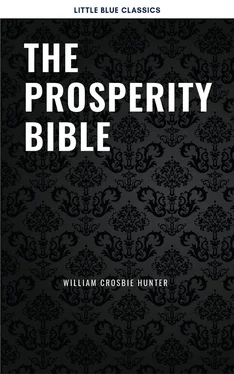—Byron,
Don Juan .
You have attended plays that seemed fair, yet they did not move you, grip you. In theatrical parlance, they failed to "get over," which means that their message did not get over the foot-lights to the audience. There was no punch, no jab to them—they had no force.
Of course, all this spells disaster, in big letters, not only in a stage production but in any platform effort. Every such presentation exists solely for the audience, and if it fails to hit them—and the expression is a good one—it has no excuse for living; nor will it live long.
What is Force?
Some of our most obvious words open up secret meanings under scrutiny, and this is one of them.
To begin with, we must recognize the distinction between inner and outer force. The one is cause, the other effect. The one is spiritual, the other physical. In this important particular, animate force differs from inanimate force—the power of man, coming from within and expressing itself outwardly, is of another sort from the force of Shimose powder, which awaits some influence from without to explode it. However susceptive to outside stimuli, the true source of power in man lies within himself. This may seem like "mere psychology," but it has an intensely practical bearing on public speaking, as will appear.
Not only must we discern the difference between human force and mere physical force, but we must not confuse its real essence with some of the things that may—and may not—accompany it. For example, loudness is not force, though force at times may be attended by noise. Mere roaring never made a good speech, yet there are moments—moments, mind you, not minutes—when big voice power may be used with tremendous effect.
Nor is violent motion force—yet force may result in violent motion. Hamlet counseled the players:
Nor do not saw the air too much with your hand, thus; but use all gently; for in the very torrent, tempest, and (as I may say) whirlwind of your passion, you must acquire and beget a temperance, that may give it smoothness. Oh, it offends me to the soul, to hear a robustious periwig-pated fellow tear a passion to tatters, to very rags, to split the ears of the groundlings; who, for the most part, are capable of nothing but inexplicable dumb show, and noise. I would have such a fellow whipped for o'er-doing Termagant; it out-herods Herod. Pray you avoid it.
Be not too tame, neither, but let your discretion be your tutor: suit the action to the word, the word to the action; with this special observance, that you o'erstep not the modesty of nature; for anything so overdone is from the purpose of playing, whose end, both at the first, and now, was, and is, to hold, as 'twere, the mirror up to Nature, to show Virtue her own feature, Scorn her own image, and the very age and body of the time his form and pressure. Now, this overdone, or come tardy off, though it make the unskillful laugh, cannot but make the judicious grieve; the censure of the which one must, in your allowance, o'erweigh a whole theater of others. Oh, there be players that I have seen play—and heard others praise, and that highly—not to speak it profanely, that, neither having the accent of Christians, nor the gait of Christian, pagan, or man, have so strutted and bellowed that I have thought some of Nature's journeymen had made men, and not made them well, they imitated humanity so abominably.
Force is both a cause and an effect. Inner force, which must precede outer force, is a combination of four elements, acting progressively. First of all, force arises from conviction . You must be convinced of the truth, or the importance, or the meaning, of what you are about to say before you can give it forceful delivery. It must lay strong hold upon your convictions before it can grip your audience. Conviction convinces.
The Saturday Evening Post in an article on "England's T.R."—Winston Spencer Churchill—attributed much of Churchill's and Roosevelt's public platform success to their forceful delivery. No matter what is in hand, these men make themselves believe for the time being that that one thing is the most important on earth. Hence they speak to their audiences in a Do-this-or-you- PERISH manner.
That kind of speaking wins, and it is that virile, strenuous, aggressive attitude which both distinguishes and maintains the platform careers of our greatest leaders.
But let us look a little closer at the origins of inner force. How does conviction affect the man who feels it? We have answered the inquiry in the very question itself—he feels it: Conviction produces emotional tension . Study the pictures of Theodore Roosevelt and of Billy Sunday in action— action is the word. Note the tension of their jaw muscles, the taut lines of sinews in their entire bodies when reaching a climax of force. Moral and physical force are alike in being both preceded and accompanied by in- tens -ity—tension—tightness of the cords of power.
It is this tautness of the bow-string, this knotting of the muscles, this contraction before the spring, that makes an audience feel —almost see—the reserve power in a speaker. In some really wonderful way it is more what a speaker does not say and do that reveals the dynamo within. Anything may come from such stored-up force once it is let loose; and that keeps an audience alert, hanging on the lips of a speaker for his next word. After all, it is all a question of manhood, for a stuffed doll has neither convictions nor emotional tension. If you are upholstered with sawdust, keep off the platform, for your own speech will puncture you.
Growing out of this conviction-tension comes resolve to make the audience share that conviction-tension . Purpose is the backbone of force; without it speech is flabby—it may glitter, but it is the iridescence of the spineless jellyfish. You must hold fast to your resolve if you would hold fast to your audience.
Finally, all this conviction-tension-purpose is lifeless and useless unless it results in propulsion . You remember how Young in his wonderful "Night Thoughts" delineates the man who
Pushes his prudent purpose to resolve, Resolves, and re-resolves, and dies the same.
Let not your force "die a-borning,"—bring it to full life in its conviction, emotional tension, resolve, and propulsive power.
Can Force be Acquired?
Yes, if the acquirer has any such capacities as we have just outlined. How to acquire this vital factor is suggested in its very analysis: Live with your subject until you are convinced of its importance.
If your message does not of itself arouse you to tension, PULL yourself together. When a man faces the necessity of leaping across a crevasse he does not wait for inspiration, he wills his muscles into tensity for the spring—it is not without purpose that our English language uses the same word to depict a mighty though delicate steel contrivance and a quick leap through the air. Then resolve—and let it all end in actual punch .
This truth is worth reiteration: The man within is the final factor. He must supply the fuel. The audience, or even the man himself, may add the match—it matters little which, only so that there be fire. However skillfully your engine is constructed, however well it works, you will have no force if the fire has gone out under the boiler. It matters little how well you have mastered poise, pause, modulation, and tempo, if your speech lacks fire it is dead. Neither a dead engine nor a dead speech will move anybody.
Four factors of force are measurably within your control, and in that far may be acquired: ideas , feeling about the subject , wording , and delivery . Each of these is more or less fully discussed in this volume, except wording, which really requires a fuller rhetorical study than can here be ventured. It is, however, of the utmost importance that you should be aware of precisely how wording bears upon force in a sentence. Study "The Working Principles of Rhetoric," by John Franklin Genung, or the rhetorical treatises of Adams Sherman Hill, of Charles Sears Baldwin, or any others whose names may easily be learned from any teacher.
Читать дальше












